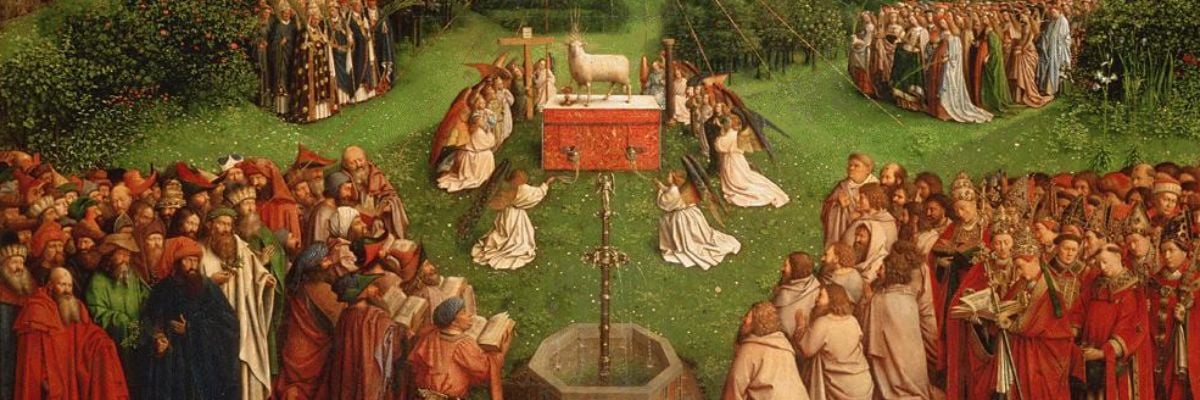
My most vivid memory of the first Mass I attended was that powerful moment in the Communion Rite where the people say, “Lamb of God, who takes away the sin of the world, have mercy on us.” “Lamb of God.” “Lamb of God.” Then they knelt, and the priest held up the host and said, “Behold the Lamb of God who takes away the sins of the world”—that was “Lamb of God” four times in less than a minute.
I was sitting in the back pew as simply an observer. But suddenly I knew where I was: I was back in the Book of Revelation where Jesus is called the Lamb of God no less than 28 times in 22 chapters. He’s only called “Lamb” in one other book in the entire New Testament: the Gospel of John, and there just twice. But in the Apocalypse, that’s his main title, more than all the other titles: Lord of Lords, King of Kings, Alpha and Omega, and all the rest. He’s the Lamb of God.
I went back to Mass the next day. I had my pad and pencil, and I had my Bible. This time I had it open to Revelation and I saw things I’d never seen before. I saw a connection in these liturgical actions. Not just one or two. Not even just eight or ten. I made a list of 30 elements: white-robed priests, an altar, a congregation chanting “Holy, holy, holy,” the alleluias, the amen, the golden chalices, the book, the invocation of angels and saints. I hardly knew which way to turn—toward the actions on the pages of the Apocalypse, or the action up at the altar. After about 15 or 20 minutes of the second Mass, suddenly I realized they were one and the same action. What I was reading on the page was exactly what I was watching up there at the altar.
So I went back and plunged myself with renewed vigor into my study of the ancient Church’s liturgy and what the bishops and theologians of the ancient Church had written about. And I discovered that this was no discovery at all—I was reinventing the wheel. I found liturgical imagery in every single chapter of the Book of Revelation, but so had they. I found elements of the Apocalypse at every single point in the Mass, and so had they. And so I’m looking at these writings of the Church Fathers, and I’m looking at the Book of Revelation, and I’m going back to Mass day after day after day without telling a soul, not even my wife.
It became obvious to me two things were unmistakably true. On the one hand, the heavenly liturgy is the golden thread that holds together all of the apocalyptic pearls in John’s revelation, starting in chapter one where Jesus appears wearing a white robe and a golden girdle. That was what the high priest wore in the Jerusalem Temple. He’s standing there among the seven gold lamp stands—that’s the Temple menorah. So as you go on to chapter two, you hear “Repent, repent” eight times, just like I heard the Penitential Rite at the opening of the Mass. Eight times in the seven letters to the seven churches you hear this, along with the promise that if you do repent and you overcome, there’s this manna that’s waiting for you.
And then, near the end of the seventh letter, come the words I’ve heard Billy Graham preach so many times: “Behold, I stand at the door and knock. If anyone hears my voice and opens the door, I will come in” (Rev. 3:20). I noticed that Billy Graham had always stopped right there. I’ll come in—what, to your heart? If you keep reading, Jesus says, “I will come in—and sup with him and he with me.” Just what supper is he talking about? That’s when it became obvious to me as I moved into chapters four and five of Revelation: Christ is talking about the Communion supper.
I realized that in the Mass I was really seeing on earth what was taking place in the heavenly liturgy that John describes in the Apocalypse. And then, on the pages of the Book of Revelation, I realized just how significant, how dramatic—how world-changing—the sacrificial worship of the Church on earth is. We are alongside the angels and the saints, singing the same songs, offering the same prayers, and watching God step into history and intervene decisively to deliver his people, or to bring down judgment, or to do whatever’s necessary to advance the kingdom of Jesus Christ.



